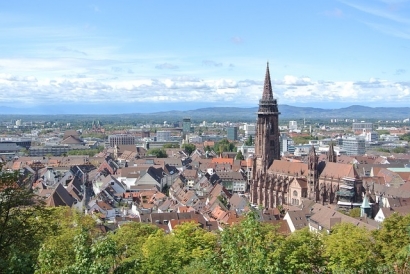
The planned climate-neutral housing development has been the subject of heated public debate in Freiburg. The city’s high quality of life has made it a popular location. It is growing rapidly and close to 25,000 more residents are expected by 2030. This is putting increased pressure on infrastructure and public services. Housing is in high demand, with ever more people on the waiting list for emergency accommodation and rents well above the German and EU average.
As a response to the housing crisis, the city announced plans for the development of a new climate-neutral district – the first of its kind in Freiburg and Germany. Dietenbach has been promoted as a green, family-friendly neighborhood.
The new district will be equipped with a modern public transport system, active mobility dominating infrastructures as well as car-sharing possibilities. Energy-efficient construction, green roofs and facades, solar energy and the use of alternative (waste) heat sources will ensure its climate-neutrality. Moreover, last year the City Council reconfirmed Freiburg’s 50 percent quota of social housing for new development projects, also to be applied in Dietenbach, to make it affordable to people with modest incomes.
What triggered the controversy was that it is to be built on an area currently made up of farmland and woods. Last year, a group of opponents to the plan calling itself Rettet Dietenbach (Save Dietenbach) gathered more than the 15,000 signatures necessary to force the city to put the issue to a public vote. The group condemned the loss of biodiversity and arable farmland to accommodate the development and advocated for an alternative, dispersed development approach to address housing needs.
However, the lead urban planners of the city argued that other options have already been implemented where possible and are too slow, due to diverse private interests, to mitigate the pressure on affordable housing significantly.
As Wolfgang Teubner, Regional Director for ICLEI Europe, headquartered in Freiburg, said, “It should be clear to all involved that this district will only be widely accepted if it develops sustainably and viably, that is, meeting the challenges and demands post-2050.”
ICLEI Europe is partnering in “C-Track 50 – Putting regions on track for carbon neutrality by 2050”. This EU-funded project mobilizes and guides more than 120 public authorities in 11 countries in defining long-term energy policy priorities, promoting multi-level governance and supporting the development, financing and implementation of Sustainable Energy and Climate Action Plans (SECAPs).
"By demanding and designing a climate-neutral district with a fifty percent quota of social housing,” says Carsten Rothballer, Coordinator for Sustainable Resources, Climate and Resilience at ICLEI Europe, “Freiburg is responding adequately to global and local challenges alike.”

